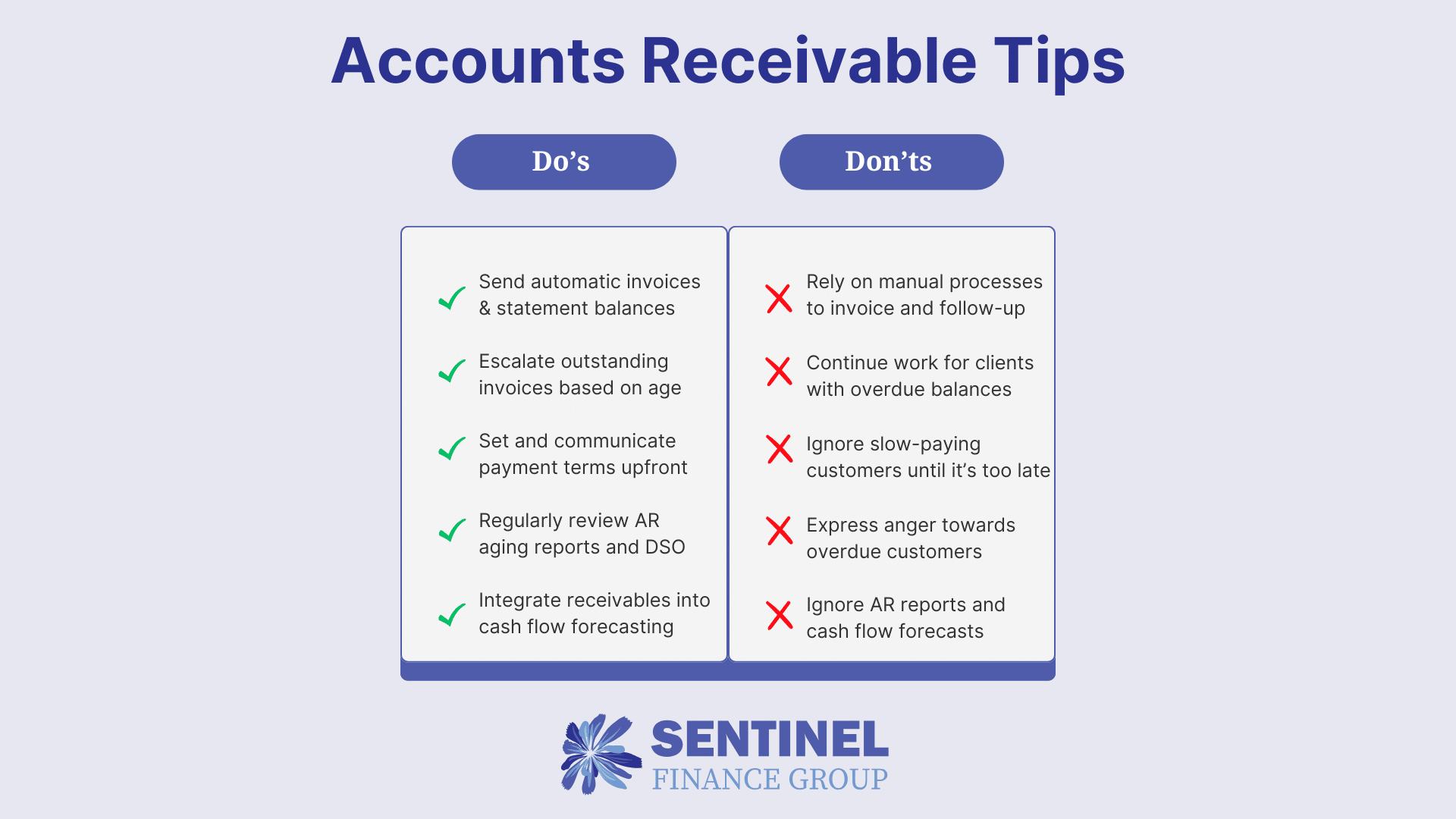For many business owners, the focus is on driving sales and delivering great work, but cash flow often tells a different story. A company can be profitable on paper and still struggle to make payroll or grow if its accounts receivable (AR) isn’t well managed.
AR represents money that has been earned but not yet collected. It’s one of the largest drivers of working capital, and one of the most common sources of financial stress for small and mid-sized businesses.
At Sentinel Finance Group, we often help clients create systems to bring structure, accountability, and automation to their receivables process. Here’s what every business owner should have in place.
1. Build a Defined System for Managing Receivables
AR management isn’t just data entry; it’s a process that protects your liquidity.
At minimum, your bookkeeper or accounting team should track every communication related to overdue invoices. Ideally, your accounting system automates much of this:
-
- Sending invoices immediately upon completion of work
-
- Issuing periodic statements to customers with outstanding balances
-
- Logging notes and reminders for follow-up
Every business should also define an escalation path based on the age of the invoice, such as:
-
- 0–30 days: Courtesy reminders and statements
-
- 30–60 days: Escalate to management for personal outreach
-
- 90+ days: Escalate to ownership or CFO for next steps
The goal is to stay professional and consistent, in order to protect both your cash position and your customer relationships.
2. Know When to Escalate or Write Off
Even with the best systems, some customers won’t pay. When that happens, escalation and documentation are key.
If an account remains delinquent after several attempts, it may need to move to small claims court or be written off as bad debt. For most businesses, any invoice older than 90 days should be reviewed for collectability.
It’s also wise to pause further work with customers who are seriously overdue until payment is received.
3. Review and Measure Regularly
The strongest companies don’t just collect; they monitor trends and make adjustments.
Your financial team or fractional CFO should regularly pull an AR Aging Report, which categorizes invoices by age and helps identify issues before they become cash flow problems.
A key metric to watch is Days Sales Outstanding (DSO), which tells you how long, on average, it takes to collect payment. If your payment terms are Net 30, you want DSO to stay close to 30. When it creeps higher, it’s time to revisit your processes, communication cadence, or client terms.
4. Strengthen the Upfront Process
Many collection issues can be prevented before the invoice ever goes out.
-
- Set clear payment terms in writing before work begins.
-
- Request deposits for large or long-term projects.
-
- Offer multiple payment methods to remove friction.
-
- Include AR trends in your cash flow forecasting to anticipate timing issues.
Proactive steps reduce the need for reactive collections.
5. Align AR with Financial Strategy
Managing receivables effectively means integrating them into your cash flow projections. When AR is integrated into financial forecasting, you can plan for growth, hiring, and capital investments with greater confidence.
That’s where fractional CFO oversight makes a difference: turning a reactive collections process into a proactive cash management system.
How Sentinel Finance Group Helps
Sentinel Finance Group partners with business owners to design and implement efficient, automated AR systems. We help clients:
-
- Establish escalation and reminder workflows
-
- Write off bad debt appropriately
-
- Run and interpret AR aging reports
-
- Integrate receivables into monthly financial reviews and forecasts
Healthy receivables management leads to stronger cash flow, fewer surprises, and more predictable growth.
If your business is profitable but often feels short on cash, it may be time to take a closer look at how your AR is managed.
Sentinel Finance Group is a fractional CFO firm in Kansas City and provides CFO services and controller services to local businesses.




